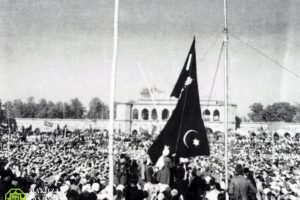
Tariq Mahmood, Canada
Who can speak with certainty as to what will happen next year? Shackled by the present, humans are not able to tell of what the future holds, even if it may be the next day or next hour.
The men of God prove to be an exception. Through the revelation of Allah, the founder of the Ahmadiyya Muslim Community, Hazrat Mirza Ghulam Ahmad (as) prophesied that a son will be born to him who would possess a relationship with Allah that few possess.
Indeed, it would be impossible for anyone to guarantee that they will have progeny. Allah, however, vouchsafed to the world that the child will be painted in divine colours.
The Promised Messiah (as) proclaimed the prophecy of God, in which Allah states:
‘He has been invested with a spirit of holiness, and he is free from all impurity. He is the light of Allah… He will be extremely intelligent and perceptive and will be meek of heart and will be filled with secular and spiritual knowledge.’1
In accordance to prophecy, Hazrat Mirza Bashiruddin Mahmud Ahmad (ra) was soon born, and as he grew older, it became obvious that this Promised Son (ra) would manifest the light of God.
At an early age, Hazrat Mirza Bashiruddin Mahmud Ahmad (ra) began to prove that his was no ordinary relationship with God.
Hazrat Syed Sarwar Shah (ra), one of the companions of the Promised Messiah (as), testifies to his relationship with God at an early age. He asked Hazrat Mirza Bashiruddin Mahmud Ahmad (ra) if he saw true dreams, to which the young child responded:
‘Maulvi sahib! I have many dreams and there is one dream I see nearly every day. From the moment my head touches the pillow to the moment I wake up in the morning I dream that there I am, leading an army. And sometimes I see us crossing oceans to fight an adversary. And many times it has happened that if I have nothing to make the crossing with, I make a boat out of reeds etc. and with it make the crossing to attack the enemy.’
Upon hearing this, Hazrat Syed Sarwar Shah (ra) relates ‘When I heard this dream from him, the thing imprinted on my heart since then was that this man will lead the Jama’at (Ahmadiyya Muslim Community) sometime in the future.’
Look how wonderful this prophecy was. Allah the Almighty prepared the young child to grow and prepare a spiritual army which would spread the light of Allah across the world.
Such a beautiful connection with Allah the Almighty necessitates powerful instances of acceptance of prayer. Indeed, when God loves His servant, then the cries of a righteous man set the power of Allah into motion.
As testament to this reality, the Promised Reformer, Hazrat Mirza Bashiruddin Mahmud Ahmad (ra) himself narrates a powerful incident:
‘It had been a few years since I required money for the construction of a house. When I received an estimation of the house and other necessities at the time, I found that I needed 10,000 rupees. I thought that I could perhaps sell a portion of some land or acquire a loan from someone. At this time, I received a note from my friend which said, “I can send 6,000 rupees for this project.” After this, only 4,000 rupees were needed. A friend of mine (who was a tax collector) wrote a letter to me [which said]:
“I have seen a dream in which the Promised Messiah (as) arrived and said to me ‘we required 10,000 rupees of which 6,000 rupees have been given, so send the remaining 4,000.’ I did not understand this dream at all. If you have a personal need or require funds for the community, I have 4,000 rupees saved up, should I send it to you?”
I wrote back to him that truly, this is my exact need, and this need has been perfectly fulfilled. Though I had this need, rather than allowing for this need to be uttered from my mouth, Allah the Almighty conveyed this need to my friend through the words of the Promised Messiah (as). Neither did he know that there is a need of 10,000 rupees, nor that someone has 6,000 rupees for it and only 4,000 rupees are required, nor did I know myself that he had this money, however Allah the Almighty arranged for the money completely, by Himself.’ 2

Such grand signs were presented by Allah as testament to the Promised Reformer’s (ra) sainthood. Allah spoke for His righteous servant, and the prophecy made decades ago was fulfilled, as Allah promised ‘Blessed is he who comes from heaven. He will be accompanied by grace which shall arrive with him.’
Prophecy of the future serves as evidence of sainthood when those chosen by Allah the Almighty are granted knowledge unknown to anyone at the time. The Promised Reformer (ra) experienced many of these prophecies in his life.
Among the multitude, Allah the Almighty especially intimated detailed knowledge of World War II to the Promised Reformer (ra) prior to its occurrence. For example, in August of 1939 Hazrat Mirza Bashiruddin Mahmud Ahmad (ra) related a dream he saw where war had broken out, with Britain and France warring against Germany.
He also saw that the British Prime Minister invited France to unite with Britain. Astonishingly, the British Prime Minister made exactly this offer in June of 1940.
The Promised Reformer (ra) once more witnessed a dream in June of 1940, in which he was put in charge of the defence of Britain. In the dream, he stated ‘There is great weakness in the air, if this could be remedied there is a good prospect of Britain pulling through.’ Soon after, the newspaper headlines read that The United States of America agreed to send 2300 military aircraft to Britain.
Allah the Almighty continuously vouchsafed information to the Promised Reformer (ra). This series of prophecies culminated in a grandiose way: in spring of 1943, the Promised Reformer (ra) stated:
‘I conceive that the war will not now last much longer. In the first half of 1945 it will either come to an end or will have reached a stage when it will become clear to everyone how it is going to end. The foundation for that end will be laid in this year, 1943. But that will not be the end of all this travail. God Almighty will prolong these tribulations till the people who have to take over the governments of the world have been properly trained.’ 3
This prophecy came true exactly as stated. Germany signed its unconditional surrender on May 7, 1945. The trials of Europe continued decades after, as economies slowly recovered from the devastation of the war.
This is the manifestation of God’s might. At a time when no child was born to the Promised Messiah (as), Allah the Almighty prophesied that his son will manifest Allah’s Power ‘As if Allah Himself descended from Heaven’.
Examine the signs of the Promised Messiah (as). For him the sun and moon eclipsed. In testament to his truth, earthquakes shook the earth and plague overtook the land. Among these signs, a child was to be born, who was to demonstrate God’s existence with the same majesty of Allah.
This was the Promised Reformer, Hazrat Mirza Bashiruddin Mahmud Ahmad (ra), a saint among saints. His life was a constant reminder of the unique and wonderful prophecy made all those years ago in India. Only now, that Promised Reformer continues to illuminate Allah’s Grandeur to the whole world. The prophecy of the Promised Reformer states ‘Behold a light comes, anointed by God with the perfume of His pleasure.’
How sweet was the fragrance of Hazrat Musleh Maud (ra) indeed.
About the Author:Tariq Mahmood is a graduate of the Ahmadiyya Institute of Languages and Theology in Canada and serves as Secretary of The Existence Project Team for The Review of Religions.
ENDNOTES
- https://www.ahmadipedia.org/content/belief/9/prophecy-musleh-e-maud
- Al-Fazl, July 11, 1939, pg. 4, Taken from Sawane Fazl-e-Umar, Volume 5, pg. 63-64.
- Fazl-e-Umar, by Mujeebur Rahman, pg. 234-236.




Add Comment